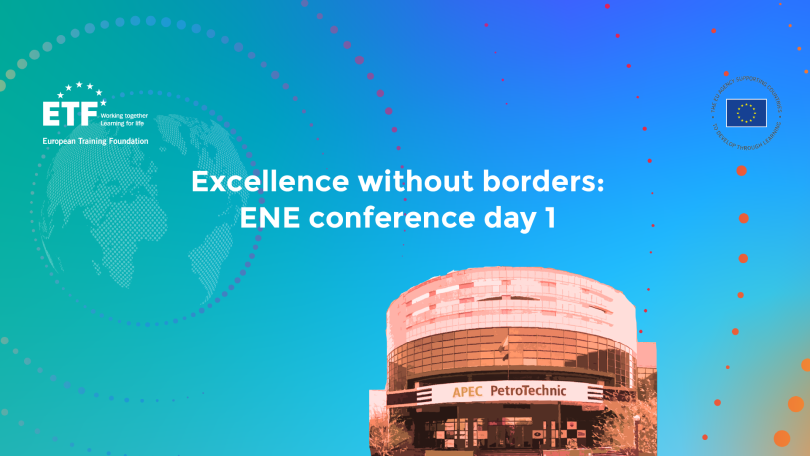
Excellence without borders: ENE conference day 1
European Commission backing, via the Erasmus + programme, has the power to make the European Training Foundation's new Network for Excellence (ENE) in vocational education a truly global platform, a senior EU official said on Thursday, 11 March.
Joao Santos, an official at the EU Commission's DG Employment, EU Support Services and Erasmus +, said that a new focus on supporting learner mobility will mean more financial backing for international platforms that encourage the sharing of excellence in vocational education.
"The green and digital transitions are at the heart of the themes the EU will be focusing on in the coming years," Mr Santos told participants Thursday in the first of a two-day online event "Centres of Excellence as engines for vocational education and training development."
He added that a call for 2022 Erasmus+ projects would be published in April and a section entitled "establishing community of practice for Centres of Excellence" will be added in June for those vocational education schools that wished to widen their partnerships.
The event, streamed by the ETF from its Turin, Italy headquarters, with contributors and participants from within the EU and partner countries that included Kazakhstan, Morocco and Serbia among others, focused on what had been achieved since the ENE network was established and core principles for driving partnerships and developing excellence in vocational education.
Initial work with the ENE network last year had focused on developing towards excellence and highlighting the role CoVEs play in work based learning (WBL), participants heard.
Self-assessment surveys had shown that CoVEs were keen to improve in areas that included pedagogy and professional development as well as building skills for greening. Boosting autonomy and working with employers on WBL and in public private partnerships were also areas of common interest across the network.
Danijela Manic, an English teacher and coordinator for international cooperation at the Aviation Academy in Belgrade, Serbia, said that by cooperating with aviation schools across Europe - in France, Czechoslovakia, Romania, Italy, Spain and Turkey - teachers were able to develop professional skills that counted towards Serbian government targets for in-service training.
"We encounter new content, new subjects," Ms Manic said. "We function like a big family and share experience with our VET teachers."
Developing WBL is another key priority area central to the work of CoVEs, whereby closely working with business and industry VET schools can attract students and help ensure a fast developing labour market has access to trained workers with state-of-the-art skills.
Agris Ruperts, Chair of Vocational Educatoin Association of Latvia, which is working on a six country pilote CoVE scheme with Albania, Armenia, Belarus, Kazakhstan, Moldova and North Macedonia, on developing WBL schemes, said: "It is often hard for schools to persuade companies to be interested in work based learning, but it is up to us to show the benefits. In many countries labour shortages are increasing, byt engaging in work based learning companies from the beginning can build their future employee."
Advancing innovative technical and digital solutions to training is another area where CoVEs are forging ahead: in Italy's Reggio Emilia region, 1,000 companies and 50,000 employees are engaged in establishing a "digital district strategy" to more effectively share skills training opportunities.
And in the Basque region of Spain, Luis De La Torre, Associate Professor at the Computer Science and Automatic Control Department, Universidad Nacional de Educación a Distancia (UNED) and CEO of Nebulous Systems, had developed software to enable the remote accessing of laboratories. For an investment of around €6,000-8000 users can access state of the art laboratories without stepping away from their own computer screen.
"With a web camera for video feedback and smart power devices that run only when you are operating a lab experiment remotely, students and researchers can access top facilities from anywhere," Mr De La Torre said.
Did you like this article? If you would like to be notified when new content like this is published, subscribe to receive our email alerts.